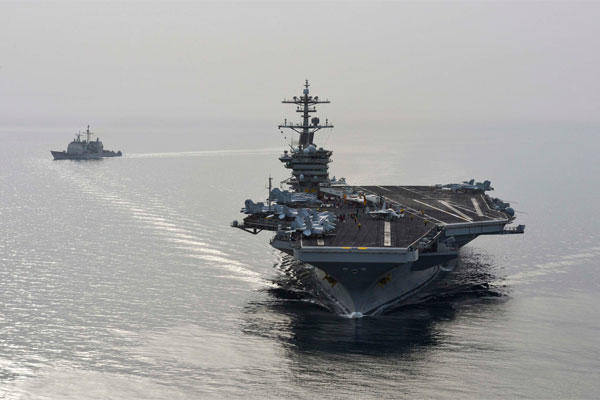The U.S. left open the possibility that nine Iranian cargo ships in international waters off Yemen could be stopped and searched if they attempted to reach port.
The nine ships being monitored by the Navy "remain in international waters in the Gulf of Aden," said Pentagon spokesman Col. Steve Warren. "They have not declared their intentions or what they're going to do. We're able to keep a close eye on them."
Warren declined to answer a "hypothetical" on whether the Navy would stop and board the ships to search for arms if they crossed from international waters into Yemen's territorial waters.
The U.S. has charged that Iran has supplied arms and other support for Shia Houthi rebels who have taken the capital, Sanaa, and are now pressing the remnants of government forces in the port city of Aden.
Warren said the addition of the aircraft carrier Theodore Roosevelt and its escort, the cruiser Normandy, to the other U.S. ships in the area gave the U.S. numerous options.
Related Video
The U.S. now has a total of nine warships in the area – the Roosevelt, the Normandy, two destroyers, two minesweepers and three amphibious ships carrying 2,200 Marines of the 24th Marine Expeditionary Unit. The nine warships are supported by three re-supply ships from the Military Sealift Command.
There were no immediate signs that the possible confrontation with Iran off Yemen would impact the already difficult negotiations with Iran on the framework agreement to rein in Tehran's nuclear programs in return for easing economic sanctions.
At the Pentagon, Warren said that "we certainly would welcome a ceasefire" to end the fighting in Yemen that has allowed the Al Qaeda in the Arabian Peninsula (AQAP) terror group to make gains in eastern Yemen.
Iran has repeatedly called for a ceasefire to stop the Saudi airstrikes that began last month, and Iranian Deputy Foreign Minister did so again Tuesday. According to a United Nations estimate, the airstrikes have killed hundreds of Houthi fighters and more than 360 civilians, and contributed to a humanitarian crisis in Yemen.
"We are optimistic that in the coming hours, after many efforts, we will see a halt to military attacks in Yemen," Hossein Amier Abdollahian was quoted as saying by Iranian news agencies, Reuters reported.
However, CBS News reported Saudi Arabia's King Salman had ordered the country's National Guard, which reports directly to the King, to join the military campaign against the Houthis, raising the possibility of a ground invasion that would dramatically escalate the war.
-- Richard Sisk can be reached at richard.sisk@military.com


























